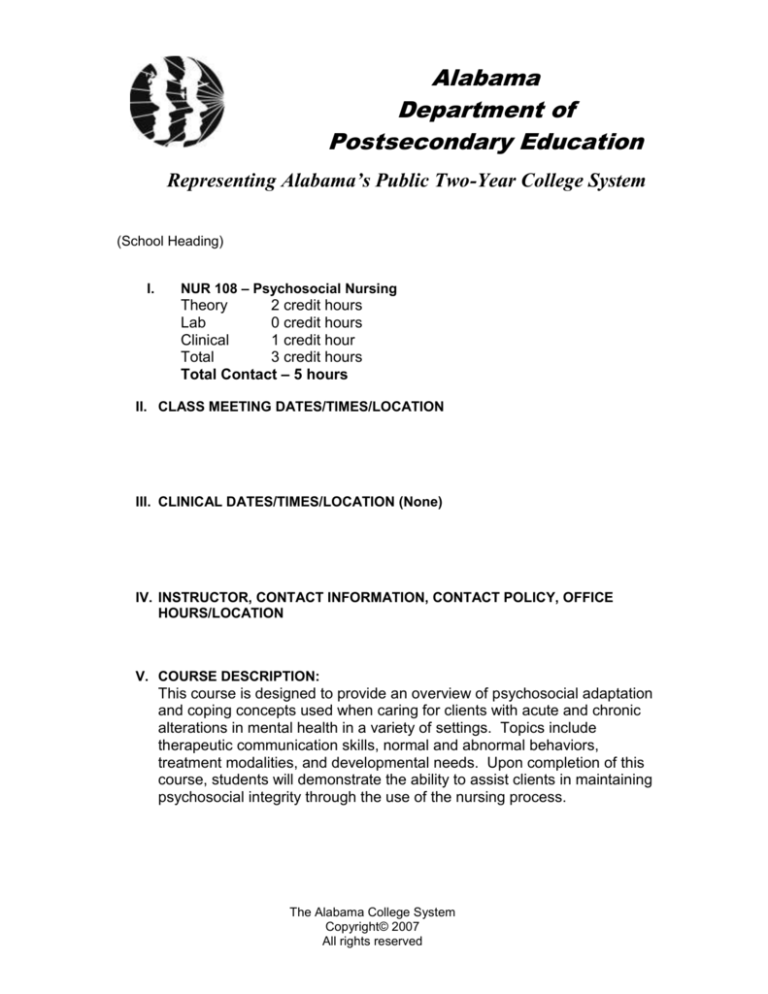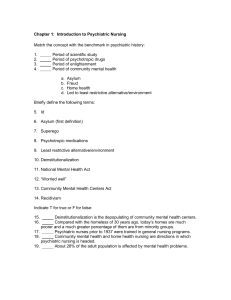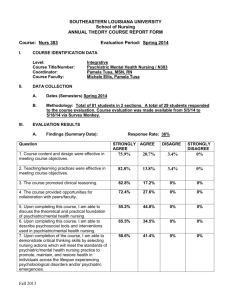
Alabama
Department of
Postsecondary Education
Representing Alabama’s Public Two-Year College System
(School Heading)
I.
NUR 108 – Psychosocial Nursing
Theory
2 credit hours
Lab
0 credit hours
Clinical
1 credit hour
Total
3 credit hours
Total Contact – 5 hours
II. CLASS MEETING DATES/TIMES/LOCATION
III. CLINICAL DATES/TIMES/LOCATION (None)
IV. INSTRUCTOR, CONTACT INFORMATION, CONTACT POLICY, OFFICE
HOURS/LOCATION
V. COURSE DESCRIPTION:
This course is designed to provide an overview of psychosocial adaptation
and coping concepts used when caring for clients with acute and chronic
alterations in mental health in a variety of settings. Topics include
therapeutic communication skills, normal and abnormal behaviors,
treatment modalities, and developmental needs. Upon completion of this
course, students will demonstrate the ability to assist clients in maintaining
psychosocial integrity through the use of the nursing process.
The Alabama College System
Copyright© 2007
All rights reserved
Psychosocial Nursing Syllabus
NURS 108
VI.
PREREQUISITE COURSES
ENG 101 – English Composition I
BIO 202 – Anatomy and Physiology II (If student selected BIO 201)
VII.
CO-REQUISITE COURSES
As determined by college.
VIII.
TEXTBOOK(S) AND OTHER LEARNING RESOURCES
ACS Copyright© 2007
All rights reserved
2
Psychosocial Nursing Syllabus
NUR 108
IX. COMPETENCIES/OBJECTIVES
MODULE A – INTRODUCTION TO PSYCHIATRIC/MENTAL HEALTH NURSING
A1.0 Explain the role of the practical nurse in psychiatric and mental health care.
A1.1 This module is measured cognitively.
A1.1.1 Define terms associated with psychiatric and mental health
nursing.
A1.1.2 Explain myths and misconceptions of mental illness.
A1.1.3 Explain selected theories related to mental health.
A1.1.4 Explain the various roles of the practical nurse working in
psychiatric and mental health agencies.
A1.1.5 Explain legal and ethical issues associated with psychiatric
and mental health nursing.
A1.1.6 Identify the practical nurse’s use of the Diagnostic and
Statistical Manual of Mental Disorders, Text Revised (DSMIVTR).
A1.1.7 Identify composition and functions of the multidisciplinary
psychiatric team.
A1.1.8 Explain the influence of cultures on treatment for mental
health issues.
MODULE B – TREATMENT MODALITIES
B1.0 Assist with providing a variety of treatment modalities while caring for clients
with psychiatric and mental health issues.
B1.1 Given a variety of scenarios and clinical situations, assist the
health care team with providing care for clients with psychiatric
and mental health issues.
B1.1.1 Define key terms associated with treatment modalities.
B1.1.2 Identify classifications of psychopharmacology.
B1.1.3 Identify actions associated with psychopharmacology.
B1.1.4 Identify indications for use of psychopharmacology.
B1.1.5 Identify side effects of psychopharmacology.
B1.1.6 Identify adverse reactions to psychopharmacology.
B1.1.7 Explain the nursing implications in psychopharmacology.
B1.1.8 Explain electro-convulsive therapy.
B1.1.9 Explain cognitive-behavioral therapy.
B1.1.10 Explain alternative therapies.
B1.1.11 Explain group therapies.
B1.1.12 Explain family therapies.
B1.1.13 Explain individual therapies.
B1.1.14 Explain interpersonal psychotherapy.
B1.1.15 Describe nutritional considerations for clients experiencing
mental health issues.
B1.1.16 Identify community resources available for caring for
culturally diverse clients experiencing mental health issues.
B1.1.17 Explain monitoring client compliance with the treatment plan.
ACS Copyright© 2007
All rights reserved
3
Psychosocial Nursing Syllabus
NUR 108
MODULE C – MENTAL HEALTH EMERGENCIES
C1.0 Apply the nursing process to clients experiencing mental health emergencies.
C1.1 Given various scenarios and clinical situations, assist with
providing nursing care for clients experiencing mental health
emergencies.
C1.1.1 Define key terms associated with mental health
emergencies.
C1.1.2 Identify phases of mental health crises.
C1.1.3 Explain the interventions for clients experiencing mental
health crises.
C1.1.4 Explain roles of the practical nurse in providing assistance to
clients experiencing mental health crises.
C1.1.5 Explain legal and ethical issues for providing nursing care to
clients experiencing mental health crises.
C1.1.6 Explain the signs and symptoms of suicide.
C1.1.7 Explain interventions to prevent suicide.
C1.1.8 Explain types of abuse related to domestic, child, and
dependent adult clients.
C1.1.9 Explain interventions related to domestic, child, and
dependent adult abuse.
C1.1.10 Define the nurse’s responsibility for documenting and
reporting suspected abuse of children and dependent adults.
C1.1.11 Explain the clinical manifestations of sexual abuse.
C1.1.12 Explain the nurse’s role in suspected sexual assault.
C1.1.13 Explain anger and aggression management.
C1.2 Use the critical thinking process to develop a nursing care plan
for clients with mental health emergencies.
MODULE D – NURSING INTERVENTIONS FOR SELECTED PSYCHIATRIC
DISORDERS
D1.0 Use the nursing process to intervene for selected psychiatric disorders.
D1.1 Develop a nursing care plan for clients experiencing selected
psychiatric disorders.
D1.1.1 Define key terms associated with selected psychiatric
disorders.
D1.1.2 Identify elements of a nursing care plan for clients
experiencing selected psychiatric disorders.
D1.2 Use the nursing process to provide care for clients experiencing
selected psychiatric disorders.
D1.2.1 Explain nursing interventions for clients experiencing
selected psychiatric disorders.
D1.3 Use critical thinking skills to determine appropriate
communication techniques with clients experiencing selected
psychiatric disorders.
D1.3.1 Differentiate between appropriate techniques used to
communicate with clients experiencing selected psychiatric
disorders.
ACS Copyright© 2007
All rights reserved
4
Psychosocial Nursing Syllabus
NUR 108
X. COURSE CONTENT OUTLINE
MODULE A – PSYCHIATRIC/MENTAL HEALTH NURSING
Definitions of mental health/mental illness
Theories related to mental health
Role of the practical nurse
Legal and ethical issues
DSM-IVTR
Multidisciplinary team
Cultural diversity
MODULE B – TREATMENT MODALITIES
Psychopharmacology
Classifications
Actions (Pharmacokinetics)
Indications for use
Side effects
Adverse reactions
Nursing implications
Therapies
Electro-convulsive therapy
Cognitive-behavioral
Alternative therapies
Group
Families
Individual
Nutritional considerations
Community resources
Monitoring compliance
MODULE C– MENTAL HEALTH EMERGENCIES
Crisis
Definitions
Stages
Interventions
Suicide
Signs and symptoms
Interventions
Violence
Abuse – domestic/child/dependent adult
Sexual abuse
Anger and aggression
ACS Copyright© 2007
All rights reserved
5
Psychosocial Nursing Syllabus
NUR 108
MODULE D – NURSING INTERVENTIONS FOR SELECTED PSYCHIATRIC
DISORDERS
Substance abuse
Schizophrenia
Mood Disorders
Anxiety disorders
Cognitive impairment
Mental retardation
Alzheimer’s
Dementia
Eating disorders
Personality disorders
Childhood disorders
Attention Deficit Disorders (ADD, ADHD)
Oppositional defiance
Impulse control
Conduct disorders
ACS Copyright© 2007
All rights reserved
6
Psychosocial Nursing Syllabus
NUR 108
XI. ATTENDANCE
a. Students are expected to attend all classes for which they are registered.
Students who are unable to attend class regularly, regardless of the reason
or circumstance, should withdraw from that class before poor attendance
interferes with the student’s ability to achieve the objectives required in the
course. Withdrawal from class can affect eligibility for federal financial aid.
Withdrawal from class can prohibit progression in nursing and allied health
programs.
b. Students are expected to attend all clinical rotations required for each course.
Only excused absences will be considered for make up. However, due to
limited clinical space and time, clinical make up days cannot be guaranteed.
Failure to complete clinical rotations will prohibit progression in nursing and
allied health programs.
XII. STATEMENT ON DISCRIMINATION/HARASSMENT
The College and the Alabama Board of Education are committed to providing
both employment and educational environments free of harassment or
discrimination related to an individual’s race, color, gender, religion, national
origin, age, or disability. Such harassment is a violation of State Board of
Education policy. Any practice or behavior that constitutes harassment is a
violation of State Board of Education policy. Any practice or behavior that
constitutes harassment or discrimination will not be tolerated.
XIII. AMERICANS WITH DISABILITIES
The Rehabilitation Act of 1973 (Section 504) and the American with Disabilities
Act of 1990 state that qualified students with disabilities who meet the essential
functions and academic requirements are entitled to reasonable
accommodations. It is the student’s responsibility to provide appropriate
disability documentation to the College.
Please contact the ADA
representative.
ACS Copyright© 2007
All rights reserved
7
Psychosocial Nursing Syllabus
NUR 108
XIV. COURSE CALENDAR
ACS Copyright© 2007
All rights reserved
8
Psychosocial Nursing Syllabus
NUR 108
XV. STUDENT ACKNOWLEDGEMENT FORM
ACS Copyright© 2007
All rights reserved
9







